Caryn
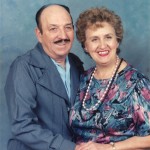
 My sisters, Cheryl Masterson, Caryl Reed, Alena Stevens, Allyn Hadlock, and I were group texting yesterday, as we often do. It gives us the chance to be together, without needing to be in the same room. We love those conversations, because we can laugh with, and at, each other, in good fun, of course. It also gives us a chance to share ideas on everything from our faith to politics, and be thankful that we all agree on both. We keep each other informed if we are traveling, just like we did our parents, when they were here on Earth. Those texts are part of what keeps us close. We all work and Caryl lives in Rawlins, while the rest of us are in Casper, so our lives are busy, and we can’t always get together on a regular basis. Texting, especially has become a great way for us to connect, and we all love it, because we love each other very much and always will.
My sisters, Cheryl Masterson, Caryl Reed, Alena Stevens, Allyn Hadlock, and I were group texting yesterday, as we often do. It gives us the chance to be together, without needing to be in the same room. We love those conversations, because we can laugh with, and at, each other, in good fun, of course. It also gives us a chance to share ideas on everything from our faith to politics, and be thankful that we all agree on both. We keep each other informed if we are traveling, just like we did our parents, when they were here on Earth. Those texts are part of what keeps us close. We all work and Caryl lives in Rawlins, while the rest of us are in Casper, so our lives are busy, and we can’t always get together on a regular basis. Texting, especially has become a great way for us to connect, and we all love it, because we love each other very much and always will.
Our family has always been a close one, and our parents, Allen and Collene Spencer instilled values in us about faith, right and wrong, and family. They are values that we will never allow to fade from our lives. Mom has been in Heaven now for almost two years, and Dad for almost nine years, and yet we can still hear their voices in our heads guiding us in love. They taught us to laugh, and not to be upset when we were the one being laughed at, because it’s better to laugh with those who are laughing at you, than to get upset about it. And in the end, you usually have to agree that it was pretty funny anyway. We were taught that laughing at yourself is a good thing, and while we may not always have practiced that, we have learned that it is a true statement. Sometimes the worst thing we can do is to take ourselves too seriously. Laughing at ourselves helps us to remember to put humor in our lives too.
Around the holidays, however, our conversations often turn to our parents, and how much we miss them. Such was the case with our conversation yesterday. My sister, Alena saw an old friend of our parents, and wanted to tell Mom that she had seen him…then reality set in. I mentioned a story I had written about a piece of family history I had found, and how I couldn’t wait to tell Mom…then reality set in. My sister, Cheryl had received a catalog, and saw a glittery top that Mom would have loved, and thought it would make a great Christmas present for Mom…then reality set in. My sister, Allyn has taken Mom Christmas shopping for a number of years, and the thought came to her that she should ask when Mom wanted to go…then reality set in. The conversation 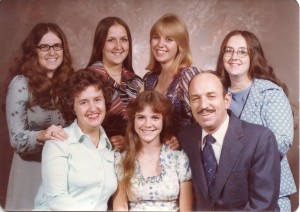 continued with each of us mentioning times that we instinctively thought of calling Mom and Dad, asking them something, taking them somewhere, or just how much they would love something, only to have reality set in again. All we have now are the sweetest memories of the greatest parents on Earth. We can see them in all the places they were…the house, church, our homes, the drives they loved to take, the front porch where they loved to sit and enjoy the day, camping in the Black Hills, and picnics on Casper Mountain…all the places they loved. All the places where their echo still exists and their memory still lingers. Reality always sets in, and we know they are gone, but they will always live on in our hearts and minds, and they are in our future now, not our past.
continued with each of us mentioning times that we instinctively thought of calling Mom and Dad, asking them something, taking them somewhere, or just how much they would love something, only to have reality set in again. All we have now are the sweetest memories of the greatest parents on Earth. We can see them in all the places they were…the house, church, our homes, the drives they loved to take, the front porch where they loved to sit and enjoy the day, camping in the Black Hills, and picnics on Casper Mountain…all the places they loved. All the places where their echo still exists and their memory still lingers. Reality always sets in, and we know they are gone, but they will always live on in our hearts and minds, and they are in our future now, not our past.
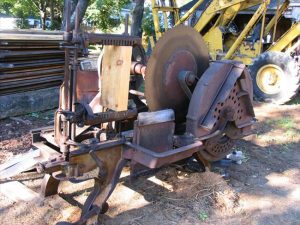 Since I’m not in the manufacturing trade, especially where wooden shingles are concerned, I had no idea that there was a trade called shingle weaving. I would assume that if shingle weaving is still done today, it is probably done by machine, because I would think that this rather dangerous occupation is one that not too many people would voluntarily put themselves into. Shingle weaving, for those who don’t know, was an extremely dangerous process in which the shingle weaver hand-fed pieces of raw wood onto an automated saw. Despite the danger of the profession, the industry was a large one throughout Washington and Oregon and by 1893 Washington state alone had 150 mills which converted Western Red Cedar into shingles and shakes for the roofing and siding of American homes. The workers normally worked ten hour shifts, standing in front of two steel saw blade disks whirling at a speed of two hundred rounds a minute. With his left hand he is feeding blocks of cedar wood into the saw, and with his right hand, he is examining the wood that came out of the left saw for knot holes to be cut out by the saw blade disk in front of him. The worker cannot stop what his right hand and his eyes are doing to see where his left hand is, creating a situation whereby his left hand could easily be cut up or even off, if he doesn’t have a good feel for where his hand is at all times in relation to that left saw blade disk. It doesn’t take much imagination to picture the concerns the workers had.
Since I’m not in the manufacturing trade, especially where wooden shingles are concerned, I had no idea that there was a trade called shingle weaving. I would assume that if shingle weaving is still done today, it is probably done by machine, because I would think that this rather dangerous occupation is one that not too many people would voluntarily put themselves into. Shingle weaving, for those who don’t know, was an extremely dangerous process in which the shingle weaver hand-fed pieces of raw wood onto an automated saw. Despite the danger of the profession, the industry was a large one throughout Washington and Oregon and by 1893 Washington state alone had 150 mills which converted Western Red Cedar into shingles and shakes for the roofing and siding of American homes. The workers normally worked ten hour shifts, standing in front of two steel saw blade disks whirling at a speed of two hundred rounds a minute. With his left hand he is feeding blocks of cedar wood into the saw, and with his right hand, he is examining the wood that came out of the left saw for knot holes to be cut out by the saw blade disk in front of him. The worker cannot stop what his right hand and his eyes are doing to see where his left hand is, creating a situation whereby his left hand could easily be cut up or even off, if he doesn’t have a good feel for where his hand is at all times in relation to that left saw blade disk. It doesn’t take much imagination to picture the concerns the workers had.
On May 1, 1916, the workers decided that they weren’t receiving enough pay for this very dangerous occupation, and the mill owners disagreed, so the Everett Shingle Weavers Union went on strike. The strike was quickly settled, in favor of the mill owners, at all but the Jamison Mill. It was at this point that the Industrial Workers of the World (IWW) got involved. A 1909 IWW strike in Spokane had cost the city over $250,000, a great deal of money at that time, so when the IWW came to Everett, the city government quickly became quite nervous. When IWW organizer and speaker James Rowan arrived in Everett on June 30, 1916, Everett became the home of the IWW’s newest Free Speech Fight. The fight, while starting out relatively peacefully, escalated when Rowan chose the corner of Hewitt and Wetmore, where public speaking was illegal, to begin his work…even though free speech was legal at other corners. I’m sure his plan was to provoke the city government in any way he could, and maybe to bring in the press. Speakers were arrested and released, keeping the jail busy for a month and a half. The delicate balance of the negotiation process continued until August 19, 1916, when violence broke out at the Jamison Mill. It was Strike Breakers against the picketers, which is usually how those things go. The mill owners didn’t have to be involved, because when people ran out of money, they had little choice but to go back to work. Those left, didn’t like the line crossing strike breakers. The police didn’t get involved, because they said the fight was on private property, and so didn’t concern them.
On October 30, all that changed when 41 IWW members came by ferry to Everett, to speak at the now notorious corner of Hewitt and Wetmore. The Sheriff and his deputies beat these men, took them to Beverly Park, and forced them to run through a gauntlet of “law and order” officials, armed with clubs and whips. After that horrific incident, the IWW organized a group of 300 men to board the steamers Verona and Calista from Seattle and head north toward Port Gardner Bay, on November 5 for a free 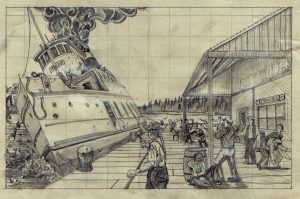 speech rally. The event ended in gun battle now known as the Everett Massacre, in which 5 strikers and 2 vigilantes calling themselves “citizen deputies” were killed and approximately 45 others wounded. The vigilantes met the IWW free speech protesters, who were on the Verona, at the dock. As the gunfire ensued, the men on the Verona ran to the opposite side, almost capsizing it. Some fell off and drown. Few of the men on the Verona had weapons, and so were defenseless. The vigilantes who were inexperienced in this type of fighting, were careless in their aim, and so in the end, many of the vigilantes who were killed or wounded were shot in the back by their own group. The massacre, also known as Everett’s Bloody Sunday, was the bloodiest battle in Pacific Northwest labor history.
speech rally. The event ended in gun battle now known as the Everett Massacre, in which 5 strikers and 2 vigilantes calling themselves “citizen deputies” were killed and approximately 45 others wounded. The vigilantes met the IWW free speech protesters, who were on the Verona, at the dock. As the gunfire ensued, the men on the Verona ran to the opposite side, almost capsizing it. Some fell off and drown. Few of the men on the Verona had weapons, and so were defenseless. The vigilantes who were inexperienced in this type of fighting, were careless in their aim, and so in the end, many of the vigilantes who were killed or wounded were shot in the back by their own group. The massacre, also known as Everett’s Bloody Sunday, was the bloodiest battle in Pacific Northwest labor history.
 Every year as the month of November arrives, my niece Jenny Spethman and her husband, Steve meet it with a sense of dread, because it is the month when their daughter, Laila Elizabeth was born and eighteen days later passed away. The grieving process has been a long and empty armed one. It’s not that they don’t have other children, because they do, and in fact, they have another daughter as well, but each child is a unique gift from Heaven, and when one is not with you, whether they passed away or moved away, your arms are simply empty where that child is concerned. No new child can replace the child who is gone, and no one can say how long the grieving process will be, or even should be, for any one person, or their loss.
Every year as the month of November arrives, my niece Jenny Spethman and her husband, Steve meet it with a sense of dread, because it is the month when their daughter, Laila Elizabeth was born and eighteen days later passed away. The grieving process has been a long and empty armed one. It’s not that they don’t have other children, because they do, and in fact, they have another daughter as well, but each child is a unique gift from Heaven, and when one is not with you, whether they passed away or moved away, your arms are simply empty where that child is concerned. No new child can replace the child who is gone, and no one can say how long the grieving process will be, or even should be, for any one person, or their loss.
Still, I think that time changes, not the sadness of a loss, but rather how we are able to compartmentalize our feelings. This year as I listened to how Jenny handles this month, I found myself in awe of her…courage. She told us that one thing that helps her to prepare for the month of November, is to watch shows about near-death experiences. It helps her to be able to glimpse Heaven from the perspective of one who has had a glimpse of it themselves. To hear of the love and peace they felt while experiencing Heaven, and to hear of loved ones they saw there, gives Jenny a feeling of hope in the knowledge that their daughter is not in their past, but rather in their future. And that future is bright and beautiful, even if it seems very far away right now. Laila is in a beautiful place, and she is happily waiting for her family to join her.
After Jenny told us about the shows she watches, and how they had helped her so much, she was talking to her boys about how the month of November is a sad one for her, but today…November 4th, which is Laila Elizabeth’s 6th birthday, should not be a sad day, because it is the day that they received the gift from Heaven  that is Laila Elizabeth. It is the day she was born, and that will always be a special day, because it is her day…her birthday. Any other day in the month can be a sad one, but this day, Laila’s birthday is a day that her family received a great blessing that will always belong to them. It is the day she was presented to them, and she was beautiful. Their love for their little girl…their first little girl, after three beautiful boys…knew no bounds. She couldn’t have been more perfectly beautiful. Now, six years after her passing, even though the rest of the month will lead to the sadness of the 22nd, they find themselves able to rejoice in the gift from Heaven that Laila was, and the gift in Heaven…waiting for their arrival, she will be in their future. Happy birthday in Heaven Laila Elizabeth. We love and miss you very much, and we will see you soon.
that is Laila Elizabeth. It is the day she was born, and that will always be a special day, because it is her day…her birthday. Any other day in the month can be a sad one, but this day, Laila’s birthday is a day that her family received a great blessing that will always belong to them. It is the day she was presented to them, and she was beautiful. Their love for their little girl…their first little girl, after three beautiful boys…knew no bounds. She couldn’t have been more perfectly beautiful. Now, six years after her passing, even though the rest of the month will lead to the sadness of the 22nd, they find themselves able to rejoice in the gift from Heaven that Laila was, and the gift in Heaven…waiting for their arrival, she will be in their future. Happy birthday in Heaven Laila Elizabeth. We love and miss you very much, and we will see you soon.
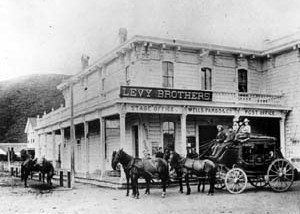 Of the men who headed west to strike it rich during the California Gold Rush, and other gold finds in history, relatively few ever found real success in the ventures. Many ended up becoming farmers or heading back east, but a few chose a different path. It always seems that when some people feel like they were gypped in something, they look for a way to even the score, as it were. That was how Charles Boles felt, after abandoning his family for the gold fields of California. When his dream of striking it rich didn’t materialize, he turned to a life of crime, but like most criminals, he left a clue that would eventually send him to prison for his crimes.
Of the men who headed west to strike it rich during the California Gold Rush, and other gold finds in history, relatively few ever found real success in the ventures. Many ended up becoming farmers or heading back east, but a few chose a different path. It always seems that when some people feel like they were gypped in something, they look for a way to even the score, as it were. That was how Charles Boles felt, after abandoning his family for the gold fields of California. When his dream of striking it rich didn’t materialize, he turned to a life of crime, but like most criminals, he left a clue that would eventually send him to prison for his crimes.
In the mid-1850s, much of the output of gold from California was transported by stagecoach and Wells Fargo wagons. Their routes often took them through isolated areas, when few lawmen were, making them prime locations for a robbery. And the outlaws in the area were quick to take advantage of those lonely stretches of roads. This type of robbery was so popular, in fact, that the company lost more than $415,000 in gold to outlaw robbers. In today’s market, that would have been worth over $12,000,000, making the loss a big motivator for the company to stop these robberies.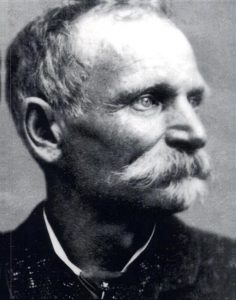
It was during this time that Charles Boles made his entry into a life of crime, using the name of Black Bart. It is believed that Black Bart’s first stagecoach robbery took place in July of 1875. He was wearing a flour sack over his head, with holes cut in it for his eyes, and a fancy gentleman’s black derby hat. I’m sure that was quite a sight to see. He intercepted a stagecoach near the California mining city of Copperopolis. Guards spotted gun barrels sticking out of nearby bushes, they handed over their strong box to Boles. He cracked open the box with an axe and escaped on foot with the gold, leaving his “gang” of camouflaged gunmen behind. When the guards returned to pick up the box, they discovered that the “rifle barrels” were just sticks tied to branches. I’m sure they were very frustrated at that point, but the deception had worked, and the money was gone.
After the success of his first robbery, Black Bart decided that he had found his niche. He proceeded to make a series of stagecoach robberies, becoming notorious. One thing to his credit was that he never shot anyone nor robbed a single stage passenger. His daring style gained him a degree of fame…that and the occasional short poems he left behind, signed by “Black Bart, the Po-8.” Wells Fargo, was not amused, however. The company set it’s private police force the to the task of capturing the bandit, dead or alive.
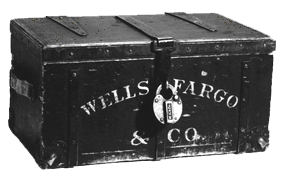 After several years of searching and tracking down clues, Wells Fargo detectives finally located Boles. On this day, November 3, 1883, the authorities almost catch Black Bart, but he managed to get away. His one mistake was that he dropped an incriminating clue that eventually sent him to prison. Black Bart was arrested and tried. He plead guilty and received a sentence of six years in San Quentin prison. He served just over four years and then was transferred to Harrisburg, Pennsylvania, after receiving a pardon. In all, Black Bart had only stolen $18,000 during the eight years of his criminal career, which in today’s market would have been $529,143.
After several years of searching and tracking down clues, Wells Fargo detectives finally located Boles. On this day, November 3, 1883, the authorities almost catch Black Bart, but he managed to get away. His one mistake was that he dropped an incriminating clue that eventually sent him to prison. Black Bart was arrested and tried. He plead guilty and received a sentence of six years in San Quentin prison. He served just over four years and then was transferred to Harrisburg, Pennsylvania, after receiving a pardon. In all, Black Bart had only stolen $18,000 during the eight years of his criminal career, which in today’s market would have been $529,143.
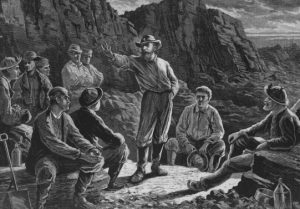 During the Great Potato Famine of September 1845 in Ireland, the leaves on potato plants suddenly turned black and curled, then rotted, seemingly the result of a fog that had rolled across the fields of Ireland. In reality, the cause was an airborne fungus named Phytophthora Infestans. It was originally transported in the holds of ships traveling from North America to England. The resulting loss of the potato crops, put the people of Ireland in dire straits. Many people decided that it was time to immigrate to America. In fact, more than a million people immigrated to America and most settled in the coal regions of Pennsylvania. Many of the Irish Catholics immigrants were routinely met with discrimination based on both their religion and heritage. They often encountered help wanted signs with disclaimers that read, “Irish need not apply.” These days, that practice would have met with harsh retaliation due to anti-discrimination laws.
During the Great Potato Famine of September 1845 in Ireland, the leaves on potato plants suddenly turned black and curled, then rotted, seemingly the result of a fog that had rolled across the fields of Ireland. In reality, the cause was an airborne fungus named Phytophthora Infestans. It was originally transported in the holds of ships traveling from North America to England. The resulting loss of the potato crops, put the people of Ireland in dire straits. Many people decided that it was time to immigrate to America. In fact, more than a million people immigrated to America and most settled in the coal regions of Pennsylvania. Many of the Irish Catholics immigrants were routinely met with discrimination based on both their religion and heritage. They often encountered help wanted signs with disclaimers that read, “Irish need not apply.” These days, that practice would have met with harsh retaliation due to anti-discrimination laws.
I know that a number of my ancestors came from Ireland, and I would not be surprised to find that a number of my ancestors were among those immigrants that came to America to find a better life. The unfortunate thing was that the few people who would hire them, and the few places that would rent to them, were corrupt people. The immigrants finally accepted the most physically demanding and dangerous mining jobs, just to have work. The men and their families were forced to live in overcrowded housing, buy from shops, and visit doctors all “owned” by the company. In many cases, workers wound up owing their employers at the end of 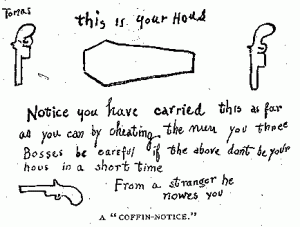 each month. The Irish immigrants were in a very tough situation, but they had been there before, and they were not going to continue to be victimized.
each month. The Irish immigrants were in a very tough situation, but they had been there before, and they were not going to continue to be victimized.
The abuse triggered a period of violence in Schuylkill County, Pennsylvania, between 1861 and 1875. The violence which included assaults, arsons, and murders were blamed on a secret society of Irish immigrants known as the Molly Maguires. The group originally emerged in northern Ireland in the 1840s, as a branch of the long line of rural secret societies including the Whiteboys and Ribbonmen, who responded to miserable working conditions and evictions by tenant landlords with bloody vengeance. When the Civil War broke out, the Irish immigrants were drafted to serve, and they rebelled by sending out “coffin notices” threatening death, because they perceived the war to be a “rich man’s war,” and they wanted no part of it. The notes were alleged to have been written by the Molly Maguires, because they didn’t want to lose their jobs to scabs. Threats were actually carried out 24 times when foremen and supervisors were assassinated.
In 1873, the president of the Reading Railroad, Franklin Gowen hired the Pinkerton Detective Agency to infiltrate and destroy the Molly Maguires, because their union activities were impeding that railroad’s ability to increase profits. The detective, James McParlan, used the alias, James McKenna to infiltrate the group. Oddly, he was an Irishman himself, but I guess money was more important to him. Franklin Gowen served as the chief 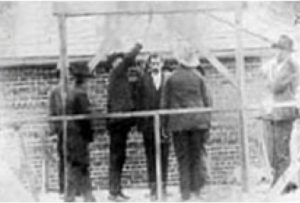 prosecutor, even though his railroad holdings made his participation a conflict of interest. Based almost entirely on McParlan’s testimony, 20 men were sentenced to death—10 of whom were executed on June 21, 1877, also known as Black Thursday. The men declared their innocence right up to the end. Although the existence of the Molly Maguires as an organized band of outlaws in America is under debate to this day, most historians now agree that the trials and executions were an outrageous perversion of the criminal justice system. In 1979, more than 100 years following his hanging, John Kehoe, who was the supposed “king” of the Molly Maguires, was granted a full pardon by the state of Pennsylvania.
prosecutor, even though his railroad holdings made his participation a conflict of interest. Based almost entirely on McParlan’s testimony, 20 men were sentenced to death—10 of whom were executed on June 21, 1877, also known as Black Thursday. The men declared their innocence right up to the end. Although the existence of the Molly Maguires as an organized band of outlaws in America is under debate to this day, most historians now agree that the trials and executions were an outrageous perversion of the criminal justice system. In 1979, more than 100 years following his hanging, John Kehoe, who was the supposed “king” of the Molly Maguires, was granted a full pardon by the state of Pennsylvania.
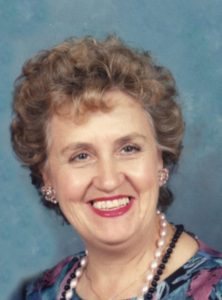
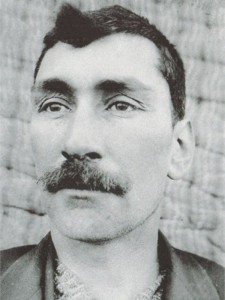 As I contemplated today’s story, I thought about one of my biggest fans…my mom, Collene Spencer, but I’m getting a little ahead of myself. I was researching a part of our family tree, after a conversation with a co-worker, Carrie Beauchamp, who had the opportunity, while living back east to visit one of the Vanderbilt mansions. I knew that my 2nd great uncle was named Cornealius Vanderbilt Spencer, but I didn’t know if there was any real connection, or rather maybe his mother just wished there had been a connection. So, I set out to look. I was pretty sure I had seen the Vanderbilt name somewhere else in my tree. My research brought me to Consuelo Vanderbilt, who married Charles Richard Spencer Churchill, who is my 15th cousin once removed.
As I contemplated today’s story, I thought about one of my biggest fans…my mom, Collene Spencer, but I’m getting a little ahead of myself. I was researching a part of our family tree, after a conversation with a co-worker, Carrie Beauchamp, who had the opportunity, while living back east to visit one of the Vanderbilt mansions. I knew that my 2nd great uncle was named Cornealius Vanderbilt Spencer, but I didn’t know if there was any real connection, or rather maybe his mother just wished there had been a connection. So, I set out to look. I was pretty sure I had seen the Vanderbilt name somewhere else in my tree. My research brought me to Consuelo Vanderbilt, who married Charles Richard Spencer Churchill, who is my 15th cousin once removed.
I knew that I was related to Winston Spencer Churchill, who is also my 15th cousin once removed, and I knew how his name had been changed from what should have been Spencer, when his 4th great grandfather, Charles Spencer married one Anne Churchill, in a merger that was mutually beneficial to both families, and changed the name to Spencer-Churchill. Through the years some of that branch of the family went on to stay 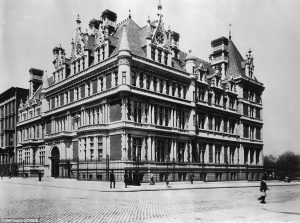 Spencer-Churchill, eventually dropping the hyphen, making the Spencer name appear to be a middle name. Others dropped the Churchill name, going back to Spencer, and still others dropped the Spencer name, deciding to stick with Churchill. Nevertheless, they are all my cousins at some level. In my search, I found where Consuelo Vanderbilt was indeed my 15th cousin once removed, and so my 2nd great grandparents, Allen and Lydia Spencer did have the actual connection to the Vanderbilt name, and were justified in naming their son Cornealius Vanderbilt Spencer. And since there was an actual Cornealius Vanderbilt, who built the Vanderbilt mansion in New York City, I guess the first name was after an ancestor too.
Spencer-Churchill, eventually dropping the hyphen, making the Spencer name appear to be a middle name. Others dropped the Churchill name, going back to Spencer, and still others dropped the Spencer name, deciding to stick with Churchill. Nevertheless, they are all my cousins at some level. In my search, I found where Consuelo Vanderbilt was indeed my 15th cousin once removed, and so my 2nd great grandparents, Allen and Lydia Spencer did have the actual connection to the Vanderbilt name, and were justified in naming their son Cornealius Vanderbilt Spencer. And since there was an actual Cornealius Vanderbilt, who built the Vanderbilt mansion in New York City, I guess the first name was after an ancestor too.
As I thought about that connection, my mind instinctively thought of how much my biggest fan…my mom would have loved that story. Of course, when those thoughts of my parents, and my desire to tell them something surface, my mind, in its ability to fool itself, thinks that I really can’t wait to tell my parents what I have found, or to have my mom read this story. She would have been so excited to hear that new information. It wasn’t that she ever wanted to be snobby, or even that she would have cared about being related to the Vanderbilt 
 family, but rather that she would have found the information very interesting, and in fact, as amazing as I did, because it really is a small world, when you think about it. I’m sure there are many other famous, rich, or even infamous people that our family is related to, because there are so many branches that split off of the originals, that it’s bound to connect us to someone famous at some point. I just always find it rather surprising every time it happens, and I think my mom did too. I wish I could have told her about it…but then I suppose she already knows.
family, but rather that she would have found the information very interesting, and in fact, as amazing as I did, because it really is a small world, when you think about it. I’m sure there are many other famous, rich, or even infamous people that our family is related to, because there are so many branches that split off of the originals, that it’s bound to connect us to someone famous at some point. I just always find it rather surprising every time it happens, and I think my mom did too. I wish I could have told her about it…but then I suppose she already knows.
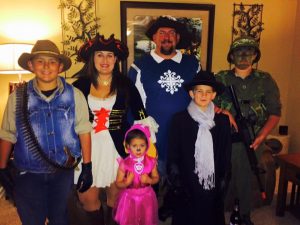
 Halloween started out as All Hallows’ Eve or All Saints’ Eve. Originally, it was to be a time dedicated to remembering the dead, including saints (hallows), martyrs, and all the faithful departed. These days, very few churches still practice it in that way, if at all. Yet, many of the Celtic traditions from Ireland that were there before Christianity came to the area, are still observed. Activities include trick-or-treating, attending Halloween costume parties, decorating, carving pumpkins into Jack O’Lanterns, lighting bonfires, apple bobbing, playing pranks, visiting haunted attractions, telling scary stories and watching horror films. Since I’m totally not a fan of horror movies, and thankfully, my husband, Bob agrees with me on that, we avoid the horror movies at all costs, and are pretty happy when Halloween is over, because then there aren’t so many horror movies on television.
Halloween started out as All Hallows’ Eve or All Saints’ Eve. Originally, it was to be a time dedicated to remembering the dead, including saints (hallows), martyrs, and all the faithful departed. These days, very few churches still practice it in that way, if at all. Yet, many of the Celtic traditions from Ireland that were there before Christianity came to the area, are still observed. Activities include trick-or-treating, attending Halloween costume parties, decorating, carving pumpkins into Jack O’Lanterns, lighting bonfires, apple bobbing, playing pranks, visiting haunted attractions, telling scary stories and watching horror films. Since I’m totally not a fan of horror movies, and thankfully, my husband, Bob agrees with me on that, we avoid the horror movies at all costs, and are pretty happy when Halloween is over, because then there aren’t so many horror movies on television. 
Over the years, the costumes worn by kids and adults alike have changed. Very few people want the traditional costumes anymore. Now it’s things like superheroes, cartoon characters, firefighters, or even period costumes, like Vikings or pirates. These days, anything goes. If it interests you, you can make it a costume. I’ve even seen people dress their little ones up as a Lego block, or a car, complete with the body of the car attached to the child’s waist. The creativity is amazing, and I wish I had thought of some of those things when my girls, Corrie Petersen and Amy Royce were little, because it would have been so cute. I wasn’t very inventive, so the girls were kind of the normal things, but my girls got more creative than I did with their kids…or maybe the costumes just got better.
With the adults getting in on the action, you will see more parties and even people dressing up at work. Some 
 offices even have contests to see who has the best costume. It’s all in the fun of the day, and lots of people spend quite a bit of time getting ready for the activities. My niece, Jenny Spethman and her husband, Steve always have a party. It is something our whole family looks forward to. Unfortunately, this year, Bob and I will have to miss out on the fun, because we have to bowl. We are disappointed, of course, but there is always next year. Happy Halloween everyone!!
offices even have contests to see who has the best costume. It’s all in the fun of the day, and lots of people spend quite a bit of time getting ready for the activities. My niece, Jenny Spethman and her husband, Steve always have a party. It is something our whole family looks forward to. Unfortunately, this year, Bob and I will have to miss out on the fun, because we have to bowl. We are disappointed, of course, but there is always next year. Happy Halloween everyone!!
 At a time when television was in the very early stages of its existence, and not really available to the public, people got their entertainment from the radio. People listened to everything from news, to music, to fictional shows, which were of course, acted out only by the actors verbalizing the parts. Most of the shows were a normal story line, probably often Westerns, and so the people were able to distinguish the fiction from the news. On this day, October 30, 1938, all that changed, when the Mercury Theater company decided to put Orson Welles on the radio in the H.G. Wells novel, War Of The Worlds. Welles had previously been the voice of The Shadow, which apparently was not a show that the people took seriously, even though it was scary. The same would not be true with War Of The Worlds, which was a dramatization of a Martian invasion of Earth. I find it odd that people would believe either show, but that is beside the point.
At a time when television was in the very early stages of its existence, and not really available to the public, people got their entertainment from the radio. People listened to everything from news, to music, to fictional shows, which were of course, acted out only by the actors verbalizing the parts. Most of the shows were a normal story line, probably often Westerns, and so the people were able to distinguish the fiction from the news. On this day, October 30, 1938, all that changed, when the Mercury Theater company decided to put Orson Welles on the radio in the H.G. Wells novel, War Of The Worlds. Welles had previously been the voice of The Shadow, which apparently was not a show that the people took seriously, even though it was scary. The same would not be true with War Of The Worlds, which was a dramatization of a Martian invasion of Earth. I find it odd that people would believe either show, but that is beside the point.
Orson Welles was just 23 years old when War Of The Worlds was first broadcast on air, but he had been in radio for several years. The War Of The Worlds show was not planned to be a radio hoax, and Welles had no idea of the havoc the show would cause. The show began on Sunday, October 30, at 8 pm. A voice announced: “The Columbia Broadcasting System and its affiliated stations present Orson Welles and the Mercury Theater on the air in ‘War of the Worlds’ by H.G. Wells.” Sunday evening was considered prime time in the world of 1938 radio. Apparently, the show prior to this one wasn’t very good, and so many people tuned in too late to hear the announcement that the War Of The Worlds was a science fiction story, and the story was already underway. Welles introduced his radio play with a spoken introduction, followed by an announcer reading a weather report. Then, the announcer seemingly abandoned the storyline, and took listeners to “the Meridian Room in the Hotel Park Plaza in downtown New York, where you will be entertained by the music of Ramon Raquello and his orchestra.” Dance music played for a while, and then the scare began. An announcer broke in to report that “Professor Farrell of the Mount Jenning Observatory” had detected explosions on the planet Mars. Then the dance music came back on, followed by another interruption in which listeners were informed that a large meteor had crashed into a farmer’s field in Grovers Mills, New Jersey. At this point, those who tuned in late, were wondering what was going on, and maybe the ones who tuned in on time were wondering too.
Soon, an announcer was at the crash site describing a Martian emerging from a large metallic cylinder. “Good heavens,” he declared, “something’s wriggling out of the shadow like a gray snake. Now here’s another and another one and another one. They look like tentacles to me…I can see the thing’s body now. It’s large, large as a bear. It glistens like wet leather. But that face, it… it…ladies and gentlemen, it’s indescribable. I can hardly force myself to keep looking at it, it’s so awful. The eyes are black and gleam like a serpent. The mouth is kind of V-shaped with saliva dripping from its rimless lips that seem to quiver and pulsate.” The story continued when the announcer said, “The Martians mounted walking war machines and fired ‘heat-ray’ weapons at the puny humans gathered around the crash site. They annihilated a force of 7,000 National Guardsman, and after being attacked by artillery and bombers the Martians released a poisonous gas into the air.” Then they declared that “Martian cylinders” had landed in Chicago and St. Louis. The radio play was extremely realistic. Welles even used sophisticated sound effects and his talented actors did an excellent job portraying terrified announcers and other characters. An announcer reported that “widespread panic had broken out in the vicinity of the landing sites, with thousands desperately trying to flee.”
In fact, that was not far from the truth, because as many as a million radio listeners believed the invasion was real. Panic broke out across the country. In this day and age, this all seems crazy, because we have seen every possible invasion story imaginable, but back then, not so much. In New Jersey, terrified people reportedly hit the highways seeking a way of escape from the alien invasion. People begged police for gas masks to save them from the toxic gas and asked electric companies to turn off the power so that the Martians wouldn’t see 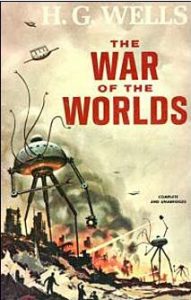 their lights. One woman ran into an Indianapolis church where evening services were being held and yelled, “New York has been destroyed! It’s the end of the world! Go home and prepare to die!”
their lights. One woman ran into an Indianapolis church where evening services were being held and yelled, “New York has been destroyed! It’s the end of the world! Go home and prepare to die!”
When the studio heard of the panic, Orson Welles went on the air as himself to remind listeners that it was just fiction. It was reported that the show caused suicides, but that was never confirmed. The Federal Communications Commission investigated the program, but found no law was broken. Networks did agree to be more cautious in their programming in the future. Orson Welles worried that the controversy would ruin his career, but the opposite was true. The publicity helped him to land a contract with a Hollywood studio, and in 1941 he wrote, directed, produced, and starred in Citizen Kane…a movie that many have called the greatest American film ever made. Of course, there are those who said that the whole thing was a hoax, but I guess we will never know for sure.

 My husband, Bob and I love to go to Denver, Colorado periodically. We usually try to go to a Rockies game, shop some, and walk a lot. I think that most people who live in Wyoming, and elsewhere across the nation, have made the trip to Denver periodically. It is a shopping hub for this area, and on top of that, it is a huge cultural hub too. Denver is not a city I would want to live in, because I really don’t care to live in such a big city, but I do enjoy going there occasionally.
My husband, Bob and I love to go to Denver, Colorado periodically. We usually try to go to a Rockies game, shop some, and walk a lot. I think that most people who live in Wyoming, and elsewhere across the nation, have made the trip to Denver periodically. It is a shopping hub for this area, and on top of that, it is a huge cultural hub too. Denver is not a city I would want to live in, because I really don’t care to live in such a big city, but I do enjoy going there occasionally.
I do wonder how I would have felt about Denver in it’s early days. Back in 1858, Denver was just a small frontier town in the Colorado Territory. In those days, the town was not called Denver, in fact, I don’t know if it even had an official name. In a city where shopping brings in a huge amount of revenue, Denver, on this day October 29, 1858, saw its first store open. One month later, the town would take on the name Denver in a ploy to gain favor from Kansas Territorial Governor James W Denver. The town was promoted by a real estate salesman from Kansas named William H Larimer Jr. The store was created to serve miners, who were working the placer gold deposits 
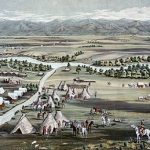 that had been discovered a year before at the confluence of Cheery Creek and the South Platte River. By 1859, tens of thousands of gold seekers had flooded into the area, but by then the placer deposits were already playing out and most miners quickly departed for home or headed west into the mountains in search of richer deposits.
that had been discovered a year before at the confluence of Cheery Creek and the South Platte River. By 1859, tens of thousands of gold seekers had flooded into the area, but by then the placer deposits were already playing out and most miners quickly departed for home or headed west into the mountains in search of richer deposits.
The area where the gold had been found is called Confluence Park, and it is one of our favorite places in Denver, because of the beautiful trail that leads to it. Strangely, in all the years that Bob and I have been going to Denver, and all the years that we have been walking that trail, and enjoying that park, we never knew of the history that happened there. I suppose we might have if we lived in Denver, or even in Colorado, but since we don’t, it was simply a nice walking trail with a nice park, in a city we enjoy going for a visit, and it always will be that, but it is also a piece of history, and now I know that.
In 1860, the frontier town of Denver almost failed before it got started, because even though it was centrally 
 located for servicing the mining camps, it didn’t have rail or water transportation to make bringing in the needed goods to the store easier, or even feasible. Even when the transcontinental Union Pacific Railroad was built, it didn’t initially stop at Denver, so the little town struggled, but by 1870, Denver finally began to overcome it’s geographical isolation, when the Kansas Pacific Railroad arrived from the east, and the 105 mile Denver Pacific Railway that joined Denver to the Union Pacific line at Cheyenne. More connections would come later on, making Denver the city it is today.
located for servicing the mining camps, it didn’t have rail or water transportation to make bringing in the needed goods to the store easier, or even feasible. Even when the transcontinental Union Pacific Railroad was built, it didn’t initially stop at Denver, so the little town struggled, but by 1870, Denver finally began to overcome it’s geographical isolation, when the Kansas Pacific Railroad arrived from the east, and the 105 mile Denver Pacific Railway that joined Denver to the Union Pacific line at Cheyenne. More connections would come later on, making Denver the city it is today.
 My niece, Susan Griffith is a sweet, kind of quiet girl, who loves living in the country and being outdoors. She loves doing all the homemaker things, like baking cakes, and this time of year, baking pumpkin seeds, which her whole family absolutely loves. Susan and her husband, Josh live out in the country, near his parents, who have horses. That gives their girls, Jala and Kaytlyn, and them the chance to ride horses sometimes, which is very cool. This summer, Susan was able to work from home, so her girls actually got to sleep in and had more time to enjoy their summer. I think it was really nice for Susan too, because she got to really spend some quality time with her girls. Most of us work, and so having a whole summer with the kids is a real gift.
My niece, Susan Griffith is a sweet, kind of quiet girl, who loves living in the country and being outdoors. She loves doing all the homemaker things, like baking cakes, and this time of year, baking pumpkin seeds, which her whole family absolutely loves. Susan and her husband, Josh live out in the country, near his parents, who have horses. That gives their girls, Jala and Kaytlyn, and them the chance to ride horses sometimes, which is very cool. This summer, Susan was able to work from home, so her girls actually got to sleep in and had more time to enjoy their summer. I think it was really nice for Susan too, because she got to really spend some quality time with her girls. Most of us work, and so having a whole summer with the kids is a real gift.
Susan and her family love to go camping, and in the past, that meant sleeping in a  tent, but no more. This year they bought a trailer, and camping took on a whole new meaning. If you have ever slept in a tent, you know what I mean. The ground is hard, even if you do have an air mattress. The nighttime coolness doesn’t stay outside of the tent…it’s right in there with you. And if it rains…well, it’s in there too, or at least that’s how it was with any tent I ever slept in. A camper is so much more comfortable…and, cooking is easier too. Susan and her family love camping, and all that goes with it, so hiking, fishing, and kicking back around the campfire are things they love to do. I can relate to that, especially the smell of coffee heating over a campfire. It doesn’t get better than that. Susan and her family often go camping with her sister, Machelle Moore, her family, and their parents, Debbie and Lynn Cook. It’s a huge procession to their favorite camping destination, the Big Horn Mountains, where they all have a really great
tent, but no more. This year they bought a trailer, and camping took on a whole new meaning. If you have ever slept in a tent, you know what I mean. The ground is hard, even if you do have an air mattress. The nighttime coolness doesn’t stay outside of the tent…it’s right in there with you. And if it rains…well, it’s in there too, or at least that’s how it was with any tent I ever slept in. A camper is so much more comfortable…and, cooking is easier too. Susan and her family love camping, and all that goes with it, so hiking, fishing, and kicking back around the campfire are things they love to do. I can relate to that, especially the smell of coffee heating over a campfire. It doesn’t get better than that. Susan and her family often go camping with her sister, Machelle Moore, her family, and their parents, Debbie and Lynn Cook. It’s a huge procession to their favorite camping destination, the Big Horn Mountains, where they all have a really great  time every time they go.
time every time they go.
Sometimes I find it hard to believe that Susan, or the rest of the kids in the family, are grown up already. I remember them as little kids, giggling, running all over the house, and fighting as much as they played, but now, they have all grown into wonderful adults, who are still friends…and funny thing, they don’t fight anymore. The years just go by too fast. Before long it will be those same kids who are looking back on how quickly the years went by with their own kids. That’s why we all have to treasure the time we’ve been given, and I think Susan definitely does. Today is Susan’s birthday. Happy birthday Susan!! Have a great day!! We love you!!

